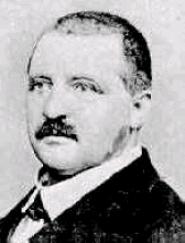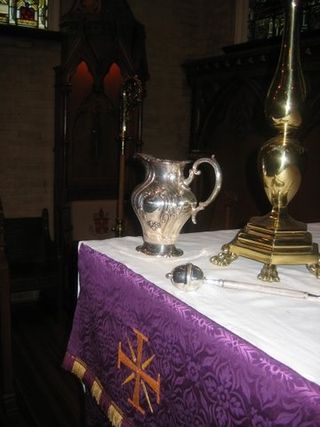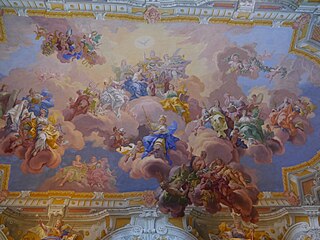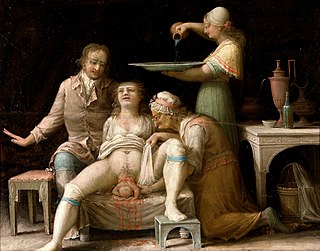
The Magnificat, WAB 24 is a setting of the Magnificat for SATB choir and soloists, orchestra and organ composed by Anton Bruckner in 1852.

The Four Orchestral Pieces are four short orchestral pieces, which Anton Bruckner composed in the fall of 1862 during his tuition with Otto Kitzler.

Pange lingua, WAB 31, is a sacred motet composed by Anton Bruckner in c. 1835. It is a setting of the first strophe of the Latin hymn Pange lingua for the celebration of Corpus Christi.

The two Asperges me, WAB 3, are sacred motets composed by Anton Bruckner. They are settings of the Latin Asperges me, the antiphon used for the celebration of Asperges.

The Festgesang, WAB 15, is a cantata composed by Anton Bruckner in 1855.

Vergißmeinnicht (Forget-me-not), WAB 93, is a cantata composed by Anton Bruckner in 1845.

Herbstlied, WAB 73, is a romantic song composed by Anton Bruckner in 1864. The song, scored for men's choir and two soprano soloists with piano accompaniment, depicts an autumn walking with nightingale song.

Du bist wie eine Blume, WAB 64, is a song, which Anton Bruckner composed in 1861.

"An dem Feste", WAB 59a, is a song composed by the 19-year-old Anton Bruckner in 1843 during his stay as schoolteacher's assistant in Kronstorf. In 1893, near the end of his life, Bruckner modified slightly its music score and let Karl Ptak put another text on the song, with as title "Tafellied", WAB 59c.

Der Lehrerstand, WAB 77, is a song composed by Anton Bruckner in c. 1847 during his stay in Sankt Florian.

Das edle Herz, WAB 65, is a song composed by Anton Bruckner in c. 1851 during his stay in St. Florian.

Die Geburt, WAB 69, is a song composed by Anton Bruckner in 1851 during his stay in St. Florian.

Das edle Herz, WAB 66, is a song composed by Anton Bruckner in December 1857 during his stay in Linz. During his stay in St. Florian, Bruckner had already composed a first setting of the song for men's choir, WAB 65.

Vaterlandslied, WAB 92, is a patriotic song composed by Anton Bruckner during his stay in Linz.

Frühlingslied, WAB 68, is a lied composed by Anton Bruckner in 1851 for the name-day of Aloisia Bogner.

Herbstkummer, WAB 72 is a lied composed by Anton Bruckner in 1864.

Mein Herz und deine Stimme, WAB 79 is a lied composed by Anton Bruckner in 1868.

















